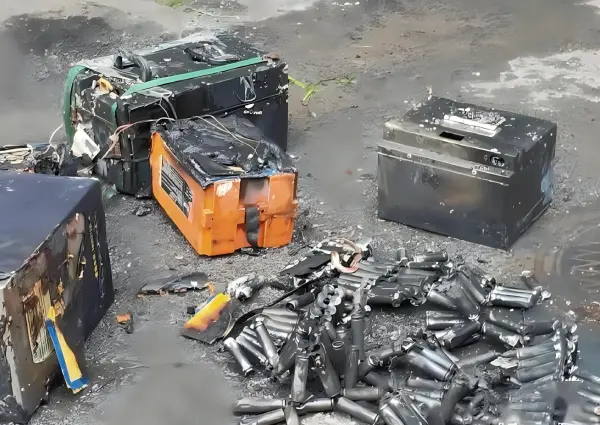In the news, we often see accidents caused by lithium battery fires and explosions. How can a lithium battery catch fire if it is not charged? What is the lithium ion battery fire temperature? How to put out a fire after a lithium battery catches fire? How to prevent lithium battery fires? This article will take you through the causes of lithium battery fires.

Part 1. Why do lithium batteries catch fire?
Lithium-ion batteries catch fire quickly, last for a long time, have high combustion temperatures, are difficult to extinguish, and may spontaneously ignite or even explode for a long time.
Lithium batteries are both combustible and a source of ignition. Once collision, extrusion, overcharge, short circuit, etc. occur, it is easy to cause fire, explosion and other safety accidents.
Lithium batteries mainly rely on the movement of lithium ions between the positive and negative electrodes to achieve the charge and discharge process. From a principle point of view, the main factors causing lithium battery explosions are overcharge and short circuit.
1. Overcharge of lithium battery
Overcharging mainly occurs during the charging process of lithium batteries. Due to the resistance of the battery, the battery will accumulate a lot of heat during the charging process. The protection device in lithium batteries can provide a certain degree of protection against overcharge by detecting voltage. However, when the overcharge time is too long and the voltage continues to be too high, dendritic short circuits are likely to occur inside the lithium-ion battery, causing the temperature and pressure of the lithium battery to continue to rise, resulting in the risk of explosion and fire.
2. Lithium battery short circuit
Short circuit mainly occurs during the use of lithium batteries. When the lithium battery is in use, its own temperature will continue to rise, and the battery also maintains normal heat dissipation. If the battery temperature is too high due to external factors, it will easily cause damage to the battery separator and cause a short circuit, which will cause excessive internal heat accumulation, trigger a chain chemical reaction, and cause the battery to explode and burn.
Part 2. Lithium battery fire temperature
The fire temperature of lithium batteries is related to the battery type and material. Normally, the lithium batteries used in mobile phone lithium batteries, mobile power supplies and lithium battery electric vehicles are all room temperature lithium batteries, and their temperature tolerance range is 0℃-60℃. If this temperature is exceeded, lithium batteries are prone to fire and explosion. Therefore, when the temperature of the lithium battery exceeds 60 degrees when charging, attention and vigilance should be paid.
How high a temperature a lithium battery can withstand depends on the type and material of the battery. Generally speaking, high-temperature lithium batteries have the largest temperature range and can even work in an environment of 800°C. And if the lithium battery is a low-temperature lithium battery, it can provide stable performance in an environment below -50°C.
In daily life, most of the lithium batteries we use are room temperature lithium batteries, and the maximum withstand temperature of this battery is below 60°C. If the ambient temperature of the lithium battery is too high or its own temperature is relatively high, it is easier to explode and catch fire.
Lithium battery gets hot to 70℃ when charging
Lithium batteries get hot when charging. If the temperature reaches 70 degrees, it is abnormal. The reason why this happens is due to short circuit in the internal circuit of the lithium battery, aging of the battery, using the wrong charger, overcharging, lack of electrolyte inside the battery and excessive ambient temperature.
If you find that the lithium battery is extremely hot when charging, the first thing you should do is unplug the charger. Then look for the cause of the battery overheating. Solve the problem of lithium battery heating when charging by replacing the charger and battery, replenishing the electrolyte, repairing the internal short circuit of the battery, and changing environmental conditions.
Part 3. How to prevent lithium batteries from catching fire?
How to correctly select and use lithium battery products, these matters should be kept in mind.
- Buy regular and qualified lithium battery products and tools.
- When lithium battery products and tools are not in use, try to remove the batteries and store them separately.
- Lithium batteries should be kept away from moisture and high temperatures, and should be kept away from flammable and combustible materials.
- After the lithium battery is fully charged, the power supply should be disconnected immediately, and do not charge continuously for a long time.
- Do not squeeze or drop lithium battery products and tools during daily use.
Part 4. What should I do if the lithium battery catches fire?
When a lithium battery catches fire, can the dry powder fire extinguisher around you put out the fire?
When a lithium battery catches fire, a dry powder fire extinguisher can only extinguish the surrounding flames and cannot effectively prevent the lithium battery from thermal runaway. Water or water-based fire extinguishers are the first choice for emergency response to lithium battery fires.
It is worth noting that the method of extinguishing fires with water/water-based fire extinguishers is suitable for lithium batteries with relatively low voltage, because there is no risk of electric shock. If a lithium battery plugged into AC power catches fire, be sure to unplug the power source before watering. Otherwise, there will not only be a risk of electric shock, but also a secondary fire caused by the electrolysis of water by 220V AC.
How to deal with lithium battery fire
- Disconnect or remove external power from the fire equipment.
- Immediately and continuously saturate the electronic device on fire with water or other non-flammable liquid to lower the temperature of the lithium battery cell core, block heat dissipation, and prevent adjacent battery cells from catching fire.
- If the device was previously connected to an electrical outlet, unplug the power from all remaining electrical outlets. Until the system is confirmed to be fault-free.
- Do not attempt to move burning or smoking electronic equipment. To prevent serious personal injury.
- Do not cover or attempt to lower the temperature with ice. This method of isolating the equipment will prevent the heat from being dissipated in a short period of time, which in turn increases the risk.
Part 5.FAQs
-
How does internal battery damage increase fire risks?
Internal damage or defects that allow direct contact between the positive and negative electrodes can cause a thermal runaway reaction and increase temperatures quickly inside the battery. . -
What external factors influence fire risks?
High external temperatures from sources like electronics overheating, fires nearby, or leaving batteries in direct sun can potentially induce thermal runaway if a battery reaches its ignition point. -
What about an electric vehicle battery fire?
Large lithium ion battery packs in EVs require specialized firefighter response due to their large size and energy. Firefighters are trained to cool and isolate damaged cells to contain the fire. -
How long does a burning battery pose a risks?
Even after the visible flames are extinguished, a lithium ion battery fire may reignite if the internal temperature remains high. Firefighters continue monitoring for hours to prevent rekindling. -
Should damaged batteries be discarded or recycled?
Batteries with internal defects pose disposal risks and should never be placed in household trash or recycling. Check with local waste services about battery recycling options or hazardous waste disposal centers.
Related Tags:
More Articles

Overview of Deep Cycle Lithium Battery
In this article, we explore the life, voltage, capacity, and charging considerations of deep cycle lithium batteries.
How Long do Lithium Batteries Last?
How long do lithium batteries last? we will explore the factors that influence the lifespan of lithium batteries and provide insights into their longevity.
How to Choose the Best LiFePO4 Battery?
Choose LiFePO4 batteries for superior performance, safety, and versatility in EVs, UPS, and backup power. This guide helps you make informed decisions.
Get 12v Lithium Car Battery As a Power Source for the Ride
Make the right choice for your vehicle's battery needs by installing a 12 volt lithium car battery. You will enjoy maintenance-free longevity with this change.
Everything About A Small Lithium Ion Battery
Discover the features, uses & future potential of a small lithium ion battery. A compact and tiny powerhouse ideal for smartphones, wearables, drones & more.





